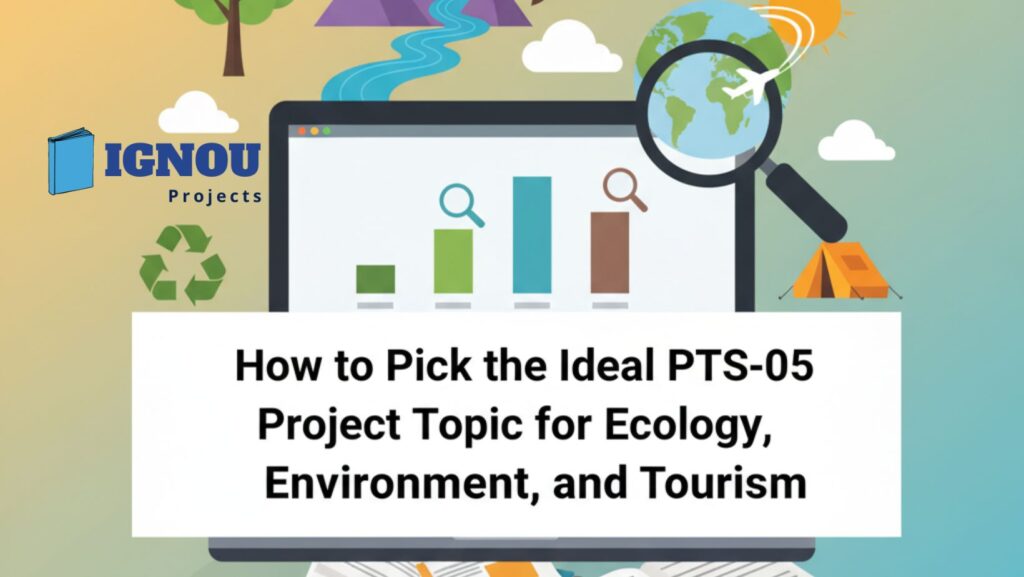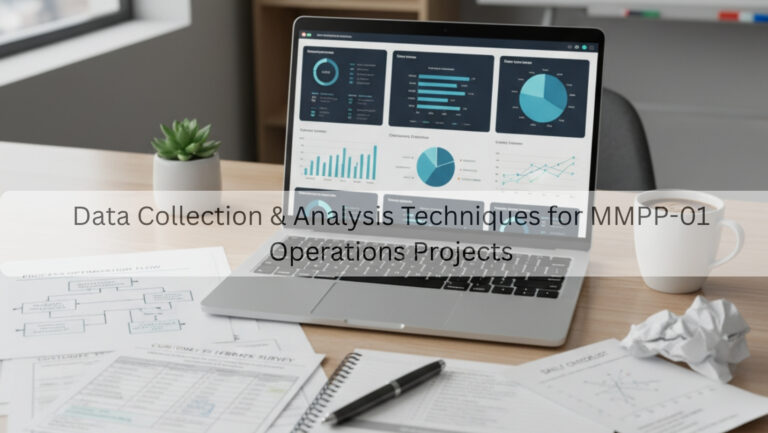Choose the Perfect PTS-05 Project Topic
How to Choose the Perfect PTS-05 Project Topic for Ecology, Environment, and Tourism

Table of Contents
Introduction
The PTS-05 Project for Ecology, Environment, and Tourism is a vital part of IGNOU’s curriculum for students who are studying Environmental Studies and Tourism courses. The selection of the perfect project topic is the initial step toward developing a high-quality project that depicts your knowledge, creativity, and research techniques.
A carefully selected topic guarantees your project is manageable, innovative, and worth the academic effort. Throughout this guide, we will discuss how to choose the perfect PTS-05 project topic, give examples, identify most frequently made mistakes, and provide students with useful tips on how to get a project approved with minimal hassle.
1. Realizing the Significance of Choosing a Topic
Choosing a project topic is not a matter of choosing some interesting topic. It has a certain crucial role to play in:
- Setting research scope – Assists in concentrating on certain objectives.
- Making it feasible – Guarantees the topic can be accomplished using available means and time.
- Enabling meaningful research – Results in data collection that can lead to insights into ecology, environment, and tourism.
- Enhancing approval possibilities – Supervisors will be more likely to approve considered, meaningful topics.
Example: A topic such as “Impact of Urbanization on Hill Station Ecosystems” is more specific and viable than a general topic such as “Environmental Issues in India.”
2. Selecting the Ideal PTS-05 Topic
While selecting your PTS-05 project topic, look for the following:
- Relevance to Course: Make sure your topic is relevant to Ecology, Environment, and Tourism goals.
- Originality: Don’t replicate past projects; aim for something new.
- Feasibility: Evaluate the data, resources, and research site availability.
- Scope: Narrower topics are preferable; too broad topics are hard to work with.
- Interest and Passion: Your personal interest will sustain you.
- Academic Value: Select a topic that adds value to current knowledge.
Tip: Consult your study center supervisor regarding possible topics to ensure course compliance.
3. Step-by-Step Guide to Picking a Topic
Step 1: Review Past Projects
Look at past PTS-05 project titles to determine common trends, gaps, and areas for innovation.
Step 2: Brainstorm Ideas
Write down your hobbies in ecology, environment, and tourism. Think of issues, trends, and observations at local or international levels.
Step 3: Evaluate Feasibility
Consider whether you can gather data, visit the study location, and finish the project within the specified time.
Step 4: Narrow Down Your List
Choose 3–5 topics that satisfy relevance, originality, and feasibility.
Step 5: Consult Supervisor
Get guidance from your supervisor in your study center to complete the topic.
4. Popular Topics for PTS-05 Project Topics
These are some top-potential areas for PTS-05 projects:
- Ecology – Forest conservation, wildlife conservation, biodiversity studies, ecosystem evaluations.
- Environment – Renewable energy adoption, waste management, water quality, climate change, air pollution.
- Tourism – Sustainable tourism practices, community involvement, eco-tourism development, impact of tourism on local ecosystems.
5. Ideal PTS-05 Project Topics Examples
Ecology:
- Evaluation of biodiversity in urban parks of [City Name].
- Impact of invasive plant species on native ecosystems.
- Bird population study of protected forest locations.
Environment: - Water quality measurement of rivers in [Region Name].
- Community waste management programs: efficacy.
- Noise pollution impact on residential areas of cities.
Tourism: - Environmental implications of tourism on hill stations.
- Evaluation of eco-tourism practices in national parks.
- Socio-economic effects of tourism on local communities.
6. Common Mistakes to Avoid When Selecting a Topic
| Error | Impact | How to Fix |
| —————————- | —————————————- | ——————————————– |
| Too broad topic | Difficult to manage, unfocused research | Narrow the scope and define clear objectives |
| Lack of originality | Rejected or repetitive topic | Seek out novel perspectives or local case studies |
| Unfeasible topic | Cannot collect data or complete research | Ensure resources and access are available |
| Disregarding supervisor instruction | Risk of rejection | Debating ideas prior to finalizing |
| Too theoretical | Lack of practical relevance | Include fieldwork, surveys, or case studies |
7. Finalizing Your PTS-05 Project Topic: Some Tips
- Select topics that address today’s environmental concerns for relevance.
- Add local case studies for easier access to data.
- Be sure the topic permits measurable objectives.
- Steer clear of topics that necessitate costly equipment or long distance travel unless possible.
- Make your research question specific and concise.
8. Creating a Project Synopsis for the Topic
When you have chosen a topic, develop a project synopsis containing:
- Project Title – Specific and concise.
- Introduction – Background and reasons for the study.
- Objectives – Principal and specific objectives.
- Methodology – Methods of data collection, analysis methods, sample size, area of study.
- Expected Outcomes – What you expect to find out.
- References – Most important literature referred to in synopsis.
Example:
- Topic: Environmental Impact of Tourism in Hill Stations
- Objective: Evaluate the impact of tourism on water quality and waste creation.
- Methodology: Field surveys, interviews with local stakeholders, water quality tests.
- Expected Outcome: Suggestions for eco-friendly tourism practices and measures to decrease pollution.
9. How to Get Your Project Approved
- Discuss your subject with study center supervisors well in advance.
- Add originality and feasibility.
- Add measurable outcomes and clear objectives.
- Give practical relevance to your synopsis.
- Adhere to IGNOU submission guidelines.
10. More Creative Study Topic Suggestions for 2025
Ecology:
- Mapping urban biodiversity through citizen science.
- Migratory bird population fluctuations by seasons.
Environment: - Community composting initiatives: efficacy.
- Use of renewable energy by rural tourism resorts.
Tourism: - Effect of adventure tourism on mountain environments.
- Evaluation of tourist eco-tourism awareness.
Conclusion
Having the perfect PTS-05 project title is the key to an effective Ecology, Environment, and Tourism project. Following a formulated process, taking into account feasibility, novelty, and suitability, and seeking the advice of supervisors, students can guarantee project acceptance and design valuable research.
Action Tip: Begin by investigating local environmental concerns, focus your efforts, and make a concise, well-organized synopsis to enhance your chances of success.




